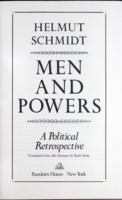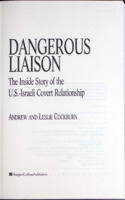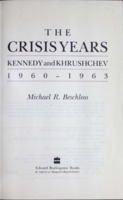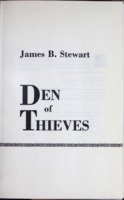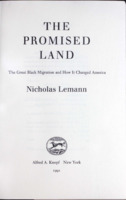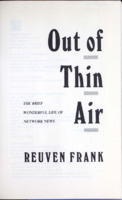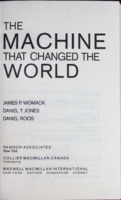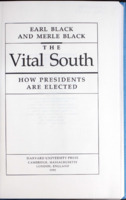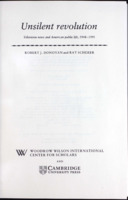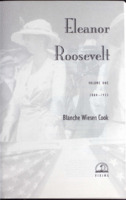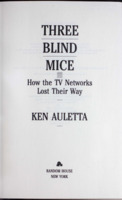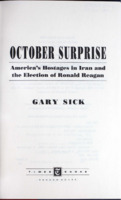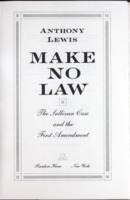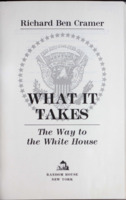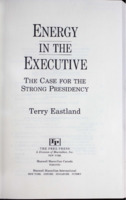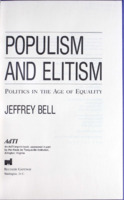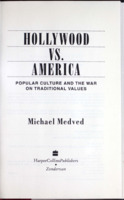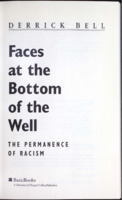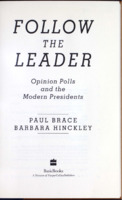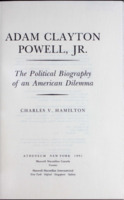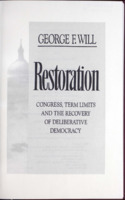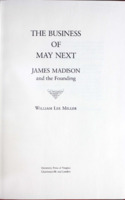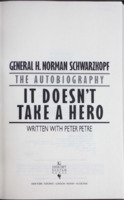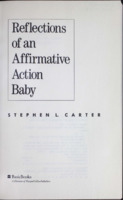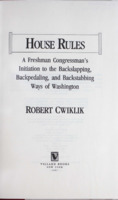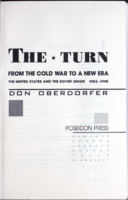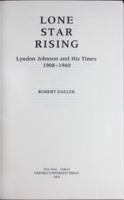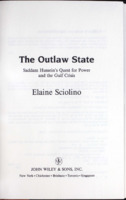Booknotes
Item set
- Title
- Booknotes
Items
728 items
-
Men and powers : a political retrospective
Recollections of the former West German chancellor, Helmut Schmidt. -
Fighting for air : in the trenches with television news
Journalist Liz Trotta recalls her career from the early days of broadcast news to the 1990s.. -
Dangerous liaison : the inside story of the U.S.-Israeli covert relationship
Andrew and Leslie Cockburn's study of the intelligence relationship between the United States and Israel. -
The crisis years : Kennedy and Khrushchev, 1960-1963
Michael Beschloss characterizes the relationship between Kennedy and Khrushchev and its impact on the Cold War. -
Den of thieves
How four men--Michael Milken, Ivan Boesky, Martin Siegel, Dennis Levine--"nearly destroyed Wall Street ... how they made billions and how they got caught." -
The promised land : the great Black migration and how it changed America
Provides identity to those who have been participants in Afro-American diaspora, and examines the issues of urban disintegration and rural poverty. -
Out of thin air : the brief wonderful life of network news
Reuven Franks account of the development of television news. -
The machine that changed the world : based on the Massachusetts Institute of Technology 5-million dollar 5-year study on the future of the automobile
James P. Womack's account of the rise of the Toyota automobile company. -
The vital South : how presidents are elected
Carry the South, control the White House. What the Democratic Party could once take for granted--a region so vast and unified that its vote in presidential elections is nothing short of decisive--Republicans now claim as their own. The first book to chronicle this massive shift of electoral power, The Vital South explores the history, meaning, and ramifications of a Republican South in the realm of presidential politics. Timely, thorough, and clearly written, this is the essential political book for 1992 as well as a definitive source on southern presidential politics for years to come. In a sweeping panorama, The Vital South looks back to the early republic and forward to the transformations of the 1990s. Deftly combining political narrative, in-depth analysis, and telling anecdotes, the book offers insight into both the dynamics of presidential campaigns within the South and the impact of the region on national elections. Earl and Merle Black, well-known authorities on southern politics, concentrate on elections since the Great Society epoch; they analyze the Nixon and Reagan years and the critical 1988 election of George Bush, and measure them against the triumph of Jimmy Carter, the sole Democrat to break the long spell of Republicanism in southern domains. Closely observing presidential candidates as they court the South, the authors illuminate party practices and clarify the meaning behind the rhetoric of campaign politics. Dixiecrats, Strom Thurmond, George Wallace, demographic shifts, urbanization, civil rights, desegregation, racial polarization, the reemergence of conservative social and cultural values--all are part of this kaleidoscopic story. It is a tale essential to an understanding of presidential politics in our time. -
Unsilent revolution : television news and American public life, 1948-1991
Robert J. Donnoan comments on the impact television news has had on politics, current events and the print media. -
Eleanor Roosevelt
A study of the complex and political figure of Eleanor Roosevelt begins with her harrowing childhood, describes the difficulties of her marriage, and explains how she persuaded Franklin to make the reforms that would make him famous. -
Three blind mice : how the TV networks lost their way
Ken Auletta coments on the decline of the major television networks particularly in the field of journalism. -
October surprise : America's hostages in Iran and the election of Ronald Reagan
Describes how the Reagan-Bush campaign made a secret deal with Iran to delay the release of the American hostages until after the 1980 election. -
Make no law : the Sullivan case and the First Amendment
Tells the story of the Sullivan case against the New York Times and the history and evolution of the First Amendment. -
What it takes : the way to the White House
Cramer tells the life stories of the principal primary candidates, including Bush, Dole, Biden, Dukakis, and Gary Hart. -
Energy in the executive : the case for the strong presidency
Every four years the race for the presidency absorbs the nation's attention. But what does it take for a President to actually govern - especially to govern well? Terry Eastland, the noted political writer who studied the presidency up close during his service in President Reagan's administration, challenges the widely held view of the presidency as an office where canny personal skills take precedence over the knowledgeable and proper use of constitutional power. In this deeply informed, unconventional, and persuasive interpretation of the nation's highest office, Eastland makes a timely case for the strong presidency, not one based on charisma or the "bully pulpit," but instead on the proper exercise of the constitutional expectations of the office, thus recovering and restating for our time the wisdom of the American founders - that "energy in the executive" is essential to good government. Eastland examines the presidency in its work with Congress, through the executive brand, and in the courts. Analyzing a wide variety of governing episodes from the Reagan and Bush years - tax reform, Iran-Contra, civil rights, Saddam Hussein, the infamous Bush "budget summit," the Supreme Court nominations of Robert Bork and Clarence Thomas - Eastland shows just what a strong presidency is, and what it is not. Focusing on the selective use of presidential rhetoric in seeking legislation, the responsibility a President has for pressing policies into the day-to-day administration of the government, and the jurisprudential legacy a President can build through well-considered judicial appointments, Eastland maintains that the strong presidency is possible only when the tools of governance are properly understood and energetically used. Eastland points the way for a new generation of politicians and government officials, arguing that the key to effective government - conservative or liberal - is understanding and carrying out the executive role in accordance with its constitutional design. Energy in the Executive is that rare political book which offers fresh insights into the much-discussed subject of governing - which is, after all, what Presidents are elected to do. -
Populism and elitism : politics in the age of equality
Jeffrey's Bell's commentary on political hegemony. -
Hollywood vs. America : popular culture and the war on traditional values
Film critic Michael Medved examines how Hollywood has broken faith with its public, creating movies, television, and popular music that exacerbate every serious social problem we face, from teenage pregnancies to violence in the streets. Michael Medved powerfully argues that the entertainment business follows its own dark obsessions, rather than giving the public what it wants: In fact, the audience for feature films and network television has demonstrated its profound disillusionment in recent years, with disastrous consequences for many entertainment companies. Meanwhile, overwhelming numbers of our fellow citizens complain about the wretched quality of our popular culture - describing the offerings of the mass media as the worst ever. Medved asserts that Hollywood ignores - and assaults - the values of ordinary American families, pursuing a self-destructive and alienated ideological agenda that is harmful to the nation at large and to the industry's own interests. In hard-hitting chapters on "The Attack on Religion," "The Addiction to Violence," "Promoting Promiscuity," "The Infatuation with Foul Language," "Kids Know Best," "Motivations for Madness," and other subjects, Medved outlines the underlying themes that turn up again and again in our popular culture. He also offers conclusive evidence of the frightening real-world impact of these messages on our society and our children. Finally, Medved shows where and how Hollywood took a disastrous wrong turn toward its current crisis, and he outlines promising efforts both in and outside the industry to restore a measure of sanity and restraint to our media of mass entertainment. Sure to elicit strong response, whether it takes the form of cheers of support or howls of enraged dissent, Hollywood vs. America confronts head-on one of the most significant issues of our times. -
Faces at the bottom of the well : the permanence of racism
The message of Bell's book is that "racism is an integral, permanent, and indestructible component of this society." He contends that blacks "are doomed to fail as long as the majority of whites do not see their own well-being threatened by the status quo."--Cover. -
Follow the leader : opinion polls and the modern presidents
Paul Brace's account of how presidents, from Truman to Bush, have been shaped by changes in opinion polls. -
Adam Clayton Powell, Jr. : the political biography of an American dilemma
Traces the career of the congressman from Harlem who became an early spokesman for civil rights but ended his career in political disgrace. -
Kissinger : a biography
Walter Isaacson's biographical work on former Secretary of State, Henry Kissinger. -
Restoration : Congress, term limits, and the recovery of deliberative democracy
The world's oldest democracy - ours - has an old tradition of skepticism about government. However, the degree of dismay about government today is perhaps unprecedented in our history. Americans are particularly convinced that Congress has become irresponsible, either unwilling or incapable of addressing the nation's problems - while it spends its time and our money on extending its members' careers. Many Americans have come to believe fundamental reform is needed, specifically limits on the number of terms legislators can serve. In Restoration, George Will makes a compelling case, drawn from our history and his close observance of Congress, that term limits are now necessary to revive the traditional values of classical republican government, to achieve the Founders' goal of deliberative democracy, and to restore Congress to competence and its rightful dignity as the First Branch of government. At stake, Will says, is the vitality of America's great promise self-government under representative institutions. At issue is the meaning of representation. The morality of representative government, Will argues, does not merely permit, it requires representatives to exercise independent judgment rather than merely execute instructions given by constituents. However, careerism, which is a consequence of the professionalization of politics, has made legislators servile and has made the national legislature incapable of rational, responsible behavior. Term limits would restore the constitutional space intended by the Founders, the healthy distance between the electors and the elected that is necessary for genuine deliberation about the public interest. Blending the political philosophy of the Founders with alarming facts about the behavior of legislative careerists, Restoration demonstrates how term limits, by altering the motives of legislators, can narrow the gap between the theory and the practice of American democracy. -
The business of May next : James Madison and the founding
Good fortune offered this nation an unusual chance at ideal nation-forming and... some honorable leaders seized that chance, writes William Lee Miller in The Business of May Next, and none among the founders made more of the opportunity than did James Madison, subject of this engaging work. Madison is depicted during the critical years between 1784 and 1791, when he was so active in articulating the governmental aims of the fledgling nation that he sometimes found himself in official dialogue with himself. More than simply a historical and biographical account, the book traces Madison's political and theoretical development as a means of illuminating its larger theme, the moral and intellectual underpinnings of the American nation. With a sound grasp of his material and a refreshing style Miller reveals how Madison's research into republics and his influence on the writing of the Constitution are central to the values for which the nation stands. From an examination of Madison's notes, Miller traces Madison's early research into other republics and their weaknesses. He reveals how Madison's thinking shaped the Virginia Plan, which, in turn, shaped the United States Constitution and the nation's institutions. The author writes that Madison sought the strands of Republicanism in history and gave republican ideals new and lasting institutional expression. He shows how the making of republican institutions became a collaboration, and how the newly created institutions contained within themselves provision for their own continuing alteration and for the involvement and influence of collective humanity down through the years. Miller follows Madison through the Constitutional Convention ("the business of May next") to the great national argument on behalf of the Constitution, notably through the Federalist papers. Of particular interest are his discussions of the constitutional deliberations over religious freedom and the institution of slavery. -
It doesn't take a hero : General H. Norman Schwarzkopf, the autobiography
In this candid, eagerly awaited autobiography General H. Norman Schwarzkopf reveals the story of his remarkable life and career. Here is the story of his boyhood years during World War II and a unique adolescence spent in the Middle East and Europe that would later prove invaluable to his understanding of the Gulf. Here, too, is a frank account of the West Point graduate's early disillusionment with the real" Army - a disappointment that nearly prompted him to leave the military." "General Schwarzkopf speaks openly about his two tours of duty in Vietnam. He recounts the "dark years" that followed, and his own role in the struggle to reform the military." "For the first time ever General Schwarzkopf provides his personal, behind-the-scenes account of Desert Shield/Desert Storm, including candid portraits of such major figures as Colin Powell, Richard Cheney and President George Bush. From the general's unique perspective we experience firsthand the complexities of coordinating the campaign in a country deeply suspicious of foreigners; of maintaining strategic secrecy during America's first internationally televised war; and of ensuring that this war would not be another Vietnam." "Thoughtful and provocative, It Doesn't Take a Hero is an intensely personal portrait of an American life, the triumphant journey of a soldier who set his star by a simple but timeless motto: duty, honor, and country."--Book jacket. -
Reflections of an affirmative action baby
Steven L. Carter's work on racial preference as told from his own personal experience. -
House rules : a freshman Congressman's initiation to the backslapping, backpedaling, and backstabbing ways of Washington
Robert Cwiklik's account of a first-year member of Congress. -
The turn : from the cold war to a new era : the United States and the Soviet Union, 1983-1990
Don Oberdorfer's account of U.S.- Soviet relations at the end of the Cold War. -
Lone star rising : Lyndon Johnson and his times, 1908-1960
Volume one of a two-volume biography follows Johnson's life from his childhood on the banks of the Pedernales to his election as vice president under Kennedy. -
The outlaw state : Saddam Hussein's quest for power and the Gulf crisis
The story of Saddam Hussein and his fierce determination to turn Iraq into a regional superpower in the Middle East which lead to the Persian Gulf War.
